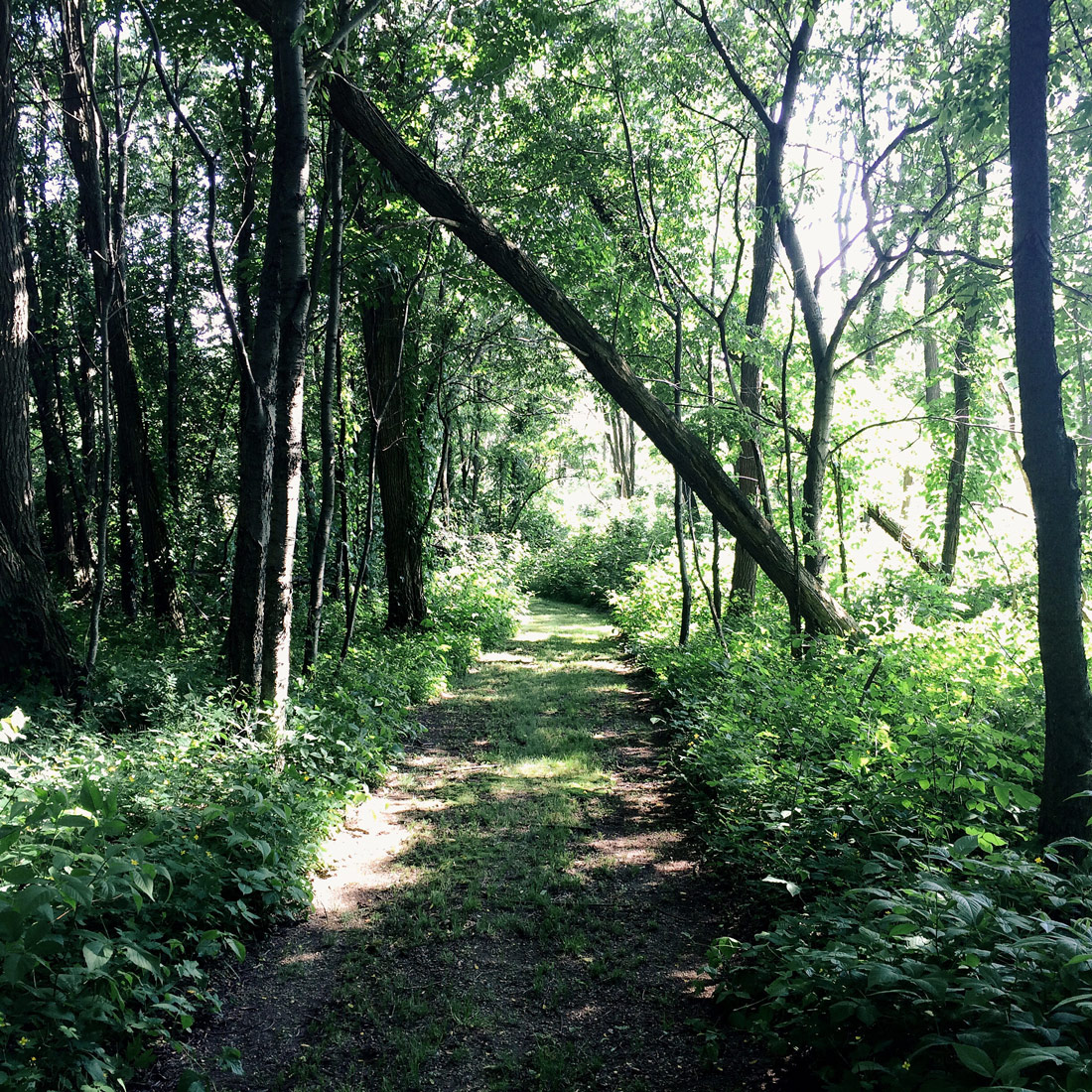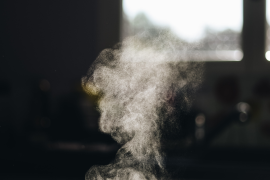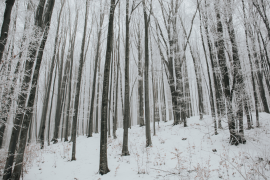I.
HE’S NOT RIDING THE BUS TO SCHOOL; he is riding in his friend’s mother’s car. His mother saw the news about the bus and the children and she said no more bus. He was going to ride with his friend in his mother’s car. The trees are spread out green like boogers when she gets him to blow his nose when he’s sick. The car is yellow and it also reminds him of snot. It’s yucky outside, but the pleasant kind of yucky—the mud is thick and the grass will stain his jeans on the knees when he slides and his mother will yell at him but will get the stains out with Tide. When he climbs a tree the tree is a building because it has a layout he could dwell in if he wanted. The trees are a thousand and there are no houses, there is only a forest.
His reflection stares at him in the window but he’s staring at the forest reflected in his mind. His skin is the color of balsa wood and he pictures himself in a tree. This time he is wearing animal skins and there is no one around. He falls out of his tree and lands on his back but is unharmed because pain does not exist in his forest. He thinks he sees himself a ghost in the reflec—
a scream of tires. He slams his head. Metal parts folding, a harsh, metallic crunch. Fragments of glass. There is not much to think about. He is back in the cave, but in a car with a jackrabbit heart. His panic is a gasp, and then the blood flowing is an unfair surprise. There are flying shapes all around, like the stars from cartoons. But they don’t fly like a halo, they look like jellyfish and he is under water. This is what shock is.
His reflection stares at him in the window but he’s staring at the forest reflected in his mind.
His friend’s mother is sorry, though it wasn’t her fault. The policeman says the man was drinking. The doctor says whiplash. So this is what whiplash is. He feels it head to toe. He cannot stop shaking. The shaking came from his jackrabbit heart. His heart jumped out in the crash. It’s under a waterfall. He thought he saw a ghost. His skin is pale. This is balsa wood before the stain; this is dead wood. He saw his own death. So this is a scar. Is it a scar if it’s everywhere? He can still walk. He can still stare out the window and dream.
II
She doesn’t speak up in class. Hands shoot up around her, eager arms. The world is a squeezing bubble full of reaching arms. Her tongue is a snail and she the shell. Shells can whisper, like the ocean from a conch. This is all she needs.
The shell is a maze full of straw. She can hide and if they find her she can jump in the straw. At the end of the maze she has her throne. If someone comes in to get her she has a spell that can freeze them so they cannot move. She speaks the spell with her lips, but when she does they cannot move.
She is called on. Her hands were in her lap, but she was called on. This was coming. Memorize a poem; memorize a lyric. Can she crawl into a box? There is a melting shell, like the walls turning to sand and the hay swallowed by the brick below. Every one has two eyes, two eyes for every boy and girl. Eyes are like fiery arrows that never hit you, but you can’t get away from them. Just a few words, just a few words is all.
How to say an R. Try it. Try it. not W, not O—just R. R as in Roses. R as in tRain. R as in teRRific. Try and see if you can do it, she said. R. R. R.
Hickowy, dickowy dock.
Two mice wan up the cwock.
The teacher raises her eyebrow, bites her lip. Laughter of demons. The maze has no walls, the throne room is thrown open. There is a man with a sword there. What is the spell? What is the spell? The spell has an R in it. So this is what being pierced is. It all started with that boy in the corner. He started it, he has the sword, he kills snails. We do not like that boy. Cover your mouth, cover your mouth. You don’t want the teacher to hug you, it makes them laugh more. Fiery arrows into the hay.
Eyes are like fiery arrows that never hit you, but you can’t get away from them.
The problem with her Rs. She could not remember it being any different. Now the shell is gone. Cry more often. Cry because the shell is not impenetrable. Don’t look anyone in the eye, they’ll know your tell. Don’t utter the spell. Her heart had been stabbed. Gather what’s left of the hay. Rebuild the walls. Begin to build a cave. Scoot on slowly, shell or not.
III
He was with his father and mother on a glittering road. God is on this road. His eyes, or his arms, reach through the trees. See those lights? Hear the fish tumbling through the stream nearby? How soft is the dirt on our feet, the dirt that God made. Soft between your toes. See God’s people up ahead? Hear the music?
He has a giant wheel made of rock that can carry him anywhere up and down the mountain. This is like an elevator, taking me up and down, back and around. This wheel does not stop. Let’s have it take us up the mountain.
Father, why are you not talking so close? Mother, why has father let go of my hand? This talk is not about school, is it? It’s not about mischief, is it? It’s not about girls, is it? Why do they have to tell him it’s not about him? Can he leave now, if he’s not in trouble?
Why are there two different houses? Our wheel can take us to a house up on the hill. See, where the people are? See the light of God? Why does he have to pick one parent, one house? He’s going to pick a cave and live in it instead. He’s going to live in a cave with a tunnel and a waterfall and a small bed to sleep in where it’s dark.
This new lady, she is not allowed in the cave. Neither is father, or even mother. This is his cave. This is where he goes when father brings home the lady, where he turns off the road with soft dirt. Where he goes when his father goes to drink and comes back not his father. This is where he goes to swim in the cave pool and live as a caveman and sleep in a hole with clay rocks that are cool and full of holes like cheese. The cave closes in. Why is he bound? Why does he feel bound to a conveyor belt? Where are we going? He can’t move; he doesn’t want to.
He’s going to live in a cave with a tunnel and a waterfall and a small bed to sleep in where it’s dark.
He sees God’s people so far away, mother. He’s going to stay in his cave. It’s cool in the cave, it’s safe. He can’t move on the conveyor belt—something’s coming towards him. It looks like a wheel with fat teeth like bricks. Will it turn him into mush? Do you know what your mother’s really like? His father has some stories to tell him. Who is mother? Who are her people? He didn’t know this. He didn’t know this. His father tells him all of it.
He can’t move on the conveyor belt. There are invisible ropes. He doesn’t want to move. Let the wheel crush him, he won’t feel a thing. He moves under the wheel and the teeth press down on him so that he turns to mush. He comes out on the other side like mush. This is what crushing is like. Look, mother, he’s not a boy any more. He’s gone to live in the cave. Lost cave. He’s not hurt, mother. He’s not hurt.
He is crushed under the wheel; He has become mush on the other side. Come see. Let’s drink to being crushed. He is not his father, and he will drink to prove it. He has to go. He can drive. He’s fine.
At least the kids weren’t hurt in the accident. Say, he has a kid too. Troubled kid. Doesn’t know why. Laughed at a girl at school today. He sure didn’t raise him to do that. He lives in a cave. So this is what a soul is. What is the soul and what do we do to it? What’s it doing in a cave, under a wheel? It is crushed and turned to mush. It grows and pulls. Intense, branching out, lasting. It’ll always be this way. We can’t move. So this is what it is to be in a cave; this is what it is like to crush us under a wheel.
Caleb Coy has an M.A. in English from Virginia Tech. His work has appeared in Connotation Press, the Common, and Streetlight. Caleb is the author of the 2015 novel An Authentic Derivative. He lives in Christiansburg, VA with his wife and two sons. He writes about language, literature, and faith at calebcoy.blog.
Like what you’re reading? Get new stories sent to your inbox every Monday.
Drop your email below to start >>>




